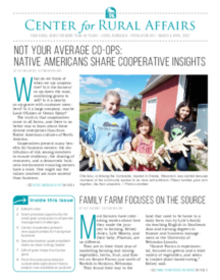Editor’s Note
We love to get out to meet you face-to-face, but due to the pandemic, some meetings haven’t been possible. So, we are reaching out in different ways such as videos on our YouTube Channel (page 1); a podcast (page 8); a Zoom gathering (page 2); and even online workshops (page 5).
These ways couldn’t be possible without progress in our communities. Throughout this issue, we give additional examples of this core value, “PROGRESS that strengthens rural communities, small businesses, and family farms and ranches,” just one value that shapes our organization.
On the front page, we take a look at the cooperative type of business model, which Native Americans use for arts, food, and more. They are able to progress their businesses while preserving their values and culture.
In another feature, Kelsey Jones and Lyle Marotz run an experimental farm to inspire plant-based eating. They want to provide equitable access to produce in communities where fresh, seasonal produce is lacking. Check out their inspirational story.
More progress can be found in Nebraska Public Power District’s goal to achieve net-zero carbon emissions by 2050.
Last, but not least, our executive director tells us about a new podcast. “Sustainable Agriculture Policy with Ron Kroese” highlights progress made throughout the last 50 years in this sector. I’ve had the pleasure of working on this project and I can’t wait to release these episodes. My favorite story is of efforts to save federal documents before they were destroyed.
As always, these articles contain just a sample of what we are up to. Read more at cfra.org/blog.
Inside this issue
Not your average co-ops: Native Americans share cooperative insights — What do we think of when we say cooperative? Is it the farmers’ co-op down the road, combining grains to sell? Is it a nearby co-op grocer with customer members? Is it a large company, maybe Land O’Lakes or Ocean Spray?
Family farm focuses on the source — Most farmers have interesting stories about how they made the journey to farming. Kelsey Jones, Lyle Marotz, and their baby, Phoenix, are no different.
From the desk of the executive director: sustainable agriculture history project now available as podcast — Throughout the nearly 50-year history of the Center, the emergence of federal policy supporting soil and water conservation, local and regional food systems, beginning farmers, and value-added agriculture is one of the most significant areas of policy wins.
Grant provides opportunity for small grain producers to share risk management challenges — Small grain producers were the focus of two roundtable discussions hosted by the Center for Rural Affairs in November. Thanks to funding from a U.S. Department of Agriculture Extension Risk Management Education (ERME) grant, this often underserved sector of the agricultural community was able to gather virtually and share their experiences growing wheat, oats, barley, and rye.
Center Academies present new opportunities for handyman business — When Sheyla Campos and Antonio Fombellida Garcia started their business Handyman Antonio, in Grand Island, Nebraska, they made sure everything was by the book.
Decarbonization goals establish state as clean energy leader — Nearly every Nebraskan is now served by an electric utility committed to supplying clean, sustainable energy.
Gift of grain helps the Center grow — Early in my farming career, I began paying attention to different farm organizations and their respective values. I determined early on that the Center for Rural Affairs’ ideas about the future of farms and rural communities made sense to me.
Special insert: Thank you, 2021 donors.


